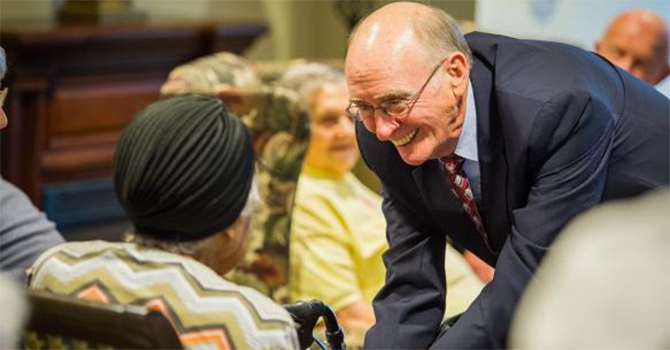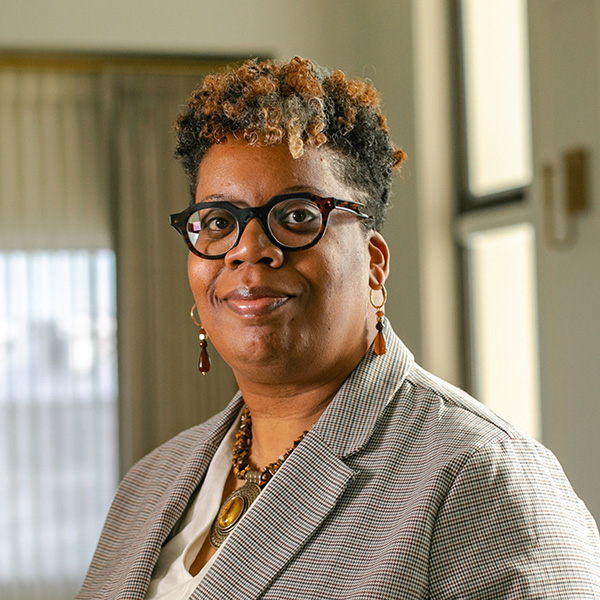Update: Linda Carder died on Oct. 3, 2019.
For the past six months, I have been serving as the chaplain at Bethany, the memory care facility in Chapin, South Carolina, where my wife, Linda, is a resident. She was diagnosed in 2009 with frontotemporal dementia, and her disease has now reached the severe stage.
As her husband and as Bethany’s chaplain, I now spend part of each day among people whose memories are being erased by brain diseases. Most have forgotten their families, places they have lived, churches they have attended, friends they have loved. But despite their tangled recollections and garbled communications, the residents utter one phrase almost universally: “I want to go home!”
For some, home is the place where they spent their childhood, the house where they grew up. For others, home is the last place they lived before being admitted to the memory care facility. And for others, home is the room just down the hallway. One woman nearing the end of her journey pleaded, “I want to go home to be with Jesus!”
Ever since our primordial parents were banished from their idyllic garden, humans have been yearning for home.
Abraham and Sarah in their old age embarked on a search for a home not made with human hands, eternal in the heavens.
When the Hebrew slaves were in Egypt, God saw their misery, heard their cries, felt their suffering and sent Moses to lead them home, to a land flowing with milk and honey.
The people of Judah mourned in lonely exile in Babylon, separated from family, their temple, their familiar songs and liturgies. They longed for home.
Longing for home is deeply embedded in the human psyche. It is an innate hunger, buried deeper even than our memories or imaginings. It is a yearning for the best of what has been and the anticipation of what can be. We hunger for the home we remember and long for the home of which we dream.

Linda, at Bethany memory care unit.
Photo by Matt Brodie.
But that longing for home is more than a desire for a place or a pleasant memory or a dreamed-of future. Home is a state of being, of belonging, of becoming. The longing for home is the deep need to be anchored in a secure, restored past and pulled toward a transformed, fulfilled future.
That yearning for home is God beckoning us toward wholeness, belonging and participation in God’s present and coming reign.
Advent means “coming,” and it is the season of remembering and preparing for home. We remember God coming to those in exile, declaring through the prophet, “Do not fear, for I have redeemed you; I have called you by name, you are mine” (Isaiah 43:1b NRSV).
The prophet pointed toward home and admonished, “In the wilderness prepare the way of the Lord, make straight in the desert a highway for our God” (Isaiah 40:3). God came to those in exile, announced that their wait was almost over and said to prepare for homecoming.
God entered into humanity’s exile as a vulnerable baby, whose birth home was a cattle stall. God enters our waiting, “tabernacles” among us and claims even smelly stables as home. In Jesus Christ, God assures us that wherever we are, we are home in the divine presence.
Advent is the season of remembering God’s coming among us in Jesus the Christ. It is also the season of expectancy, as we anticipate the coming of God’s final victory over all that threatens home. Our final home is envisioned by John, who was exiled on the island of Patmos during severe persecution:
And I heard a loud voice from the throne saying,
“See, the home of God is among mortals.
He will dwell with them;
they will be his peoples,
and God himself will be with them;
he will wipe every tear from their eyes.
Death will be no more;
mourning and crying and pain will be no more,
for the first things have passed away.” (Revelation 21:3-4)
We live between God’s coming in Bethlehem’s stable and God’s coming reign of justice, compassion, generosity and joy. While we wait for the final homecoming, we know that we aren’t alone.
God has entered our exiles, our lonely places, reminding us, “Do not fear, for I have redeemed you; I have called you by name, you are mine. … Do not fear, for I am with you” (Isaiah 43:1b, 5a).
“I want to go home,” pleaded the resident at Bethany, the memory care facility.
“Who is at home?” I asked.
“My mom and dad,” she replied. “And they love me.”
I took her by the hand, looked into her eyes and said, “I love you, too. People here love you.”
“Is this home?” she asked with a slight smile, her eyes twinkling with hope. “Am I home?”
“Yes, this is home for now,” I assured her.
I reminded her that she was at “Bethany,” the home of Mary and Martha, where Jesus felt at home.
“Jesus is at home at Bethany,” I said. “And so are we.”
Her smile grew wider, and her eyes became brighter.
“Jesus lives here?” she said, at once questioning and assured.
Then, with a sigh, she squeezed my hand slightly.
“Jesus will help me go home,” she said.
Suddenly, it was Advent!
While we wait, we enter the loneliness and exile of others with compassion, sensitivity and solidarity. Thereby, we and they remember the home from which we came and get a glimpse of the home for which we yearn.









